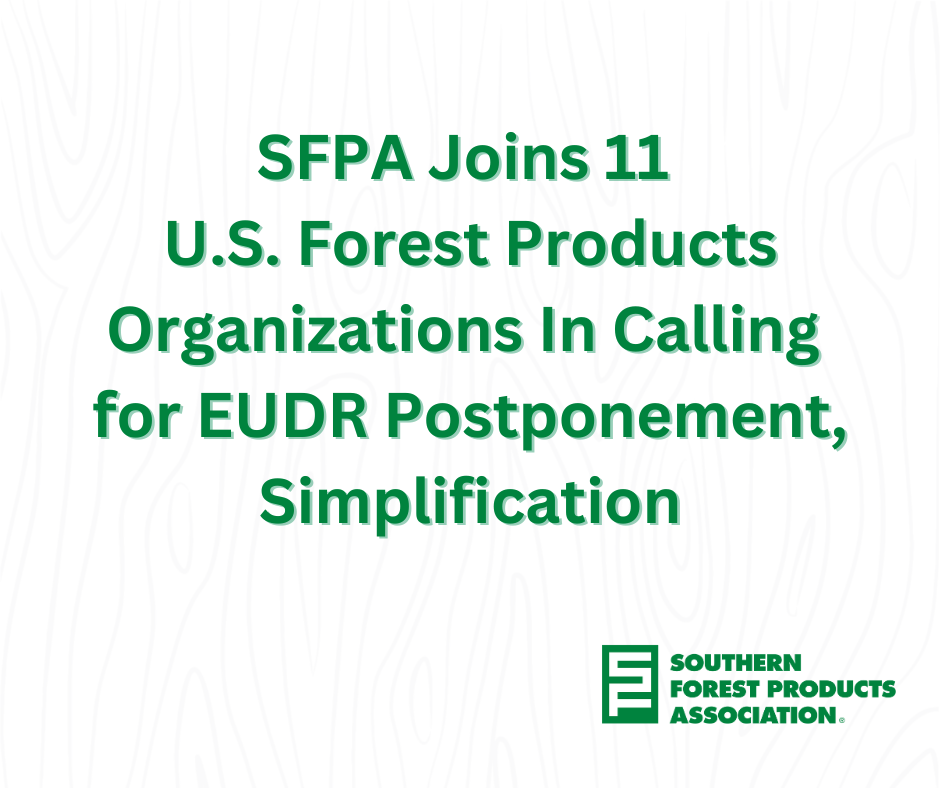The Southern Forest Products Association has joined 11 leading U.S. forestry organizations in urging the European Union to fully delay and simplify the implementation of the EU Deforestation Regulation (EUDR).
The European Commission’s recent proposals for EUDR simplification and a partial delay undermine certainty and do not reflect the need for more workable obligations for responsible supply chains.
“SFPA strongly supports a thoughtful, comprehensive approach to EUDR implementation,” said Eric Gee, SFPA’s executive director. “A full delay is necessary to ensure the regulation is both effective and practical for responsible, low-risk supply chains like those in the United States. Rushing simplification risks unintended trade disruptions and places unnecessary burdens on U.S. sustainably managed forests.”
The undersigned organizations, representing the U.S. forestry and forest products sector value chain, urge the EU Parliament and Council to avoid a rushed process and pursue meaningful simplification with great care. SFPA recently joined several organizations representing the U.S. forestry and forest products sector value chain to urge the Commission to avoid a rushed process and take the time necessary to pursue simplification with great care.
A full delay is needed to engage in productive dialogue with forest owners and operators in highly forested, low-risk countries like the U.S. to understand implementation challenges and reduce unintended consequences.
The European Commission proposed new EU Deforestation Regulation (EUDR) implementation deadlines and compliance measures October 20, 2025, that large- and medium-sized enterprises must comply by December 30, 2025, but will receive a six-month grace period for enforcement. Micro and small enterprises will have until December 30, 2026.
There had been discussions over the past several months that the Commission was considering a complete delay until December 2026. The European Parliament has already delayed implementation once, moving the launch from December 30, 2024, to December 30, 2025.
Simplifying a law of this global scale requires appropriate time for focused, deliberate action to reduce compliance burdens while maintaining the law’s rigor and focus on combating global deforestation.
We encourage the EU to take a more careful and considered approach to simplification, which can ultimately strengthen the law and ensure effective and equitable implementation across all affected commodities and geographies.
“We remain committed to working collaboratively with EU institutions and other U.S. forest sector organizations to develop solutions that uphold rigorous environmental goals while maintaining fairness, transparency, and continuity for forest products markets worldwide,” Gee said.
In addition, a fully functioning IT system before the application is a must to avoid trade disruptions. The U.S. forestry and forest products sector remains committed to sustainable forest management and deforestation-free forest products.
SFPA continues to engage with U.S. trade representatives and the Department of Commerce, as well as other organizations representing affected commodities, to highlight the significant challenges the EUDR poses to the agricultural and forest products supply chain, especially in how it may impact Southern Pine exports.
We welcome continued collaboration with EU institutions to ensure the EUDR is effective, enforceable, and fair. Click here to read the full letter.
- American Forest & Paper Association
- American Forest Foundation
- American Hardwood Export Council
- American Wood Council
- Forest Landowners Association
- Forest Resources Association
- Hardwood Federation
- National Alliance of Forest Owners
- Softwood Export Council
- Southeastern Lumber Manufacturers Association
- Southern Forest Products Association
- Treated Wood Council
